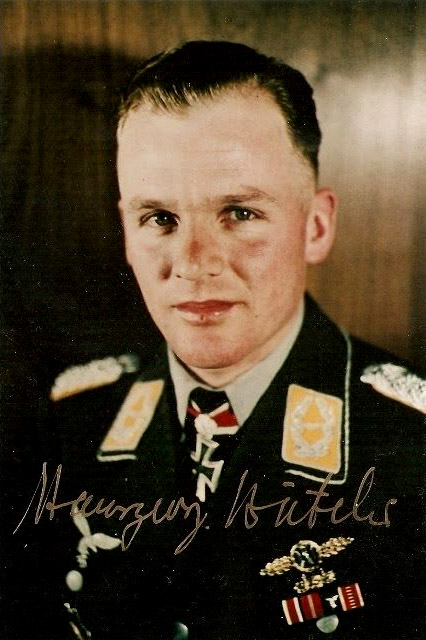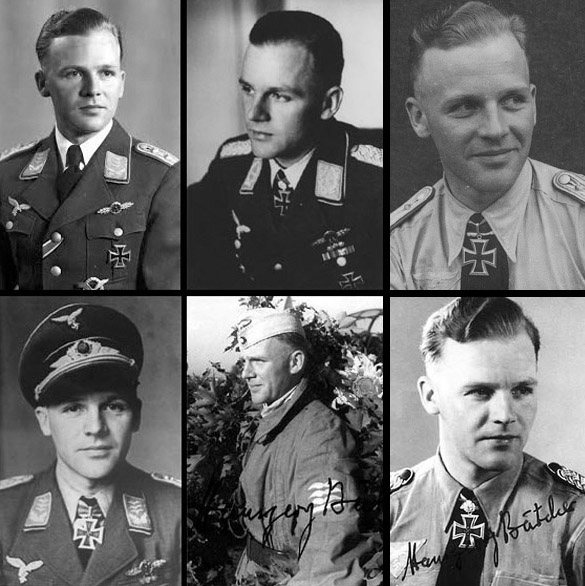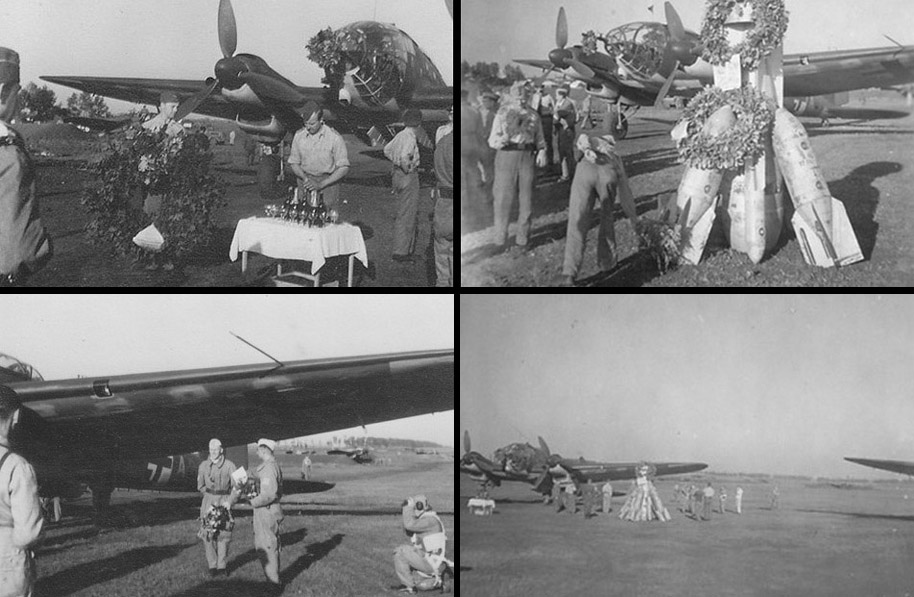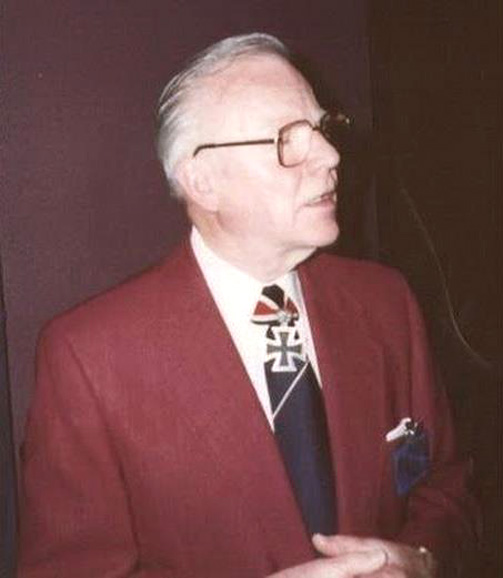
This is a 1993 interview done with extraordinary He 111 pilot Hansgeorg Bätcher (January 13, 1914 – April 23, 2003). Bätcher flew more bomber sorties than any other Kampfflieger in the Luftwaffe, some 650 and finished the war at the controls of the Arado Ar 234 jet aircraft.

[Above: Hansgeorg Bätcher.]
I would like to ask you some unconventional questions regarding the war and what you experienced if that’s ok?
Hansgeorg: Yes you may ask away, I have no restrictions on what you wish to ask. I have known your tante (aunt) for a while and know what type of questions you care to ask.
Can you just tell me briefly what interested you in joining the LW?
Hansgeorg: Ohh sure that’s an easy one for me. I have always been interested in aviation and airplanes. From reading books about our hero fighter pilots of WW1 to the newer planes I saw growing up; I knew I had to fly. Germany of the 30s was not the same country of the early century. Adolf Hitler not only created a strong economy and ended the depression; he instilled in all of the young a strong sense of sacrifice to help our people.
In the youth groups I was in, I was able to learn to fly gliders and won every qualification I could, making sure I made myself better and better. I was up against some very good competition, who I would later meet at different stages of the war. Once I reached the age of military service I volunteered for the new Luftwaffe. I wanted to be a pilot, preferable in a fast new fighter, but that was not to be. During my intake, I had to go through many exams both oral and written, to determine where I would fit best.
A former fighter pilot told me that the new bomber arm needed good pilots and he felt I would fit in best there so I agreed, to my dismay. However, duty is duty and I wanted to be the best bomber pilot I could be.
What do you remember about the start of the war?
Hansgeorg: I was a Lt in 1 Gruppe of KG27, and remember the start of the war well. The Führer said in Mein Kampf that the lands Germany had lost from Versailles should be returned, and he would work towards that end. The Rheinland, Sudetenland, Memel, and Danzig all were yearning to be part of this successful Reich. The countries that were given control of these areas, of course wanted to keep them, as they were prime farm, industrial, and mining areas. Poland was the only one who refused German requests to work out a solution, by this time Britain was getting tired of seeing all her work undone, so they pressured Poland to refuse our offers. We were starting to see the clouds of war start to gather as our press was reporting on the border attack’s that were still happening and causing casualties. The Poles even tried to shoot down a Lufthansa plane heading to Prussia.
So we knew something was going to happen. In August my unit was sent to the border and we had stepped up our training in precision bombing, which our HE111 had a very good bombardier. We were called to a briefing room early on Sept 1, 1939. We were told that a state of war existed between the Reich and Poland, we were stunned. We were given target information, and told very clearly that the world would be watching us, we needed to avoid hitting anywhere civilians were likely to be living. This is very important, as the Allies’ claim the bombing of civilians was started by us in Poland.
Many times, we would drop canisters with leaflets urging the civilian population living around any military target to leave. This was not always possible, but we did try to avoid killing innocent people who had nothing to do with the war. We went on many missions during the Polish war, mainly hitting railyards and bridges. We would attack, and then be called back to attack again in a few days as the damage had been repaired.
Did you ever have to bomb a city, and what effects did you see?
Hansgeorg: Yes, the Polish army decided that every city in Poland would be turned into a front line city, which made them legal targets. Warsaw is probably the most well-known. The Führer gave orders that no Polish city would be bombed without trying to get the civilians out. We dropped many loads of leaflets on Warsaw, to the point of betraying our intentions. We later learned that very few civilians were allowed to leave the city. Each Gruppe was given specific targets, where our intelligence showed military concentrations.
It is a surreal experience to be up so high and see the beauty of a city being destroyed. I was hoping they took steps to protect their people and treasures. We were shown post-bombing photos and saw for the most part we did a good job of sticking to our targets. I did notice some rows of houses were damaged and I hoped no one was in them. We made it through the Polish war and felt as if we had our baptism plus combat experience now. We were then sent to the western front, we had to attack Holland, Belgium, and France. KG54 was part of the bombing of Rotterdam, which was such an unfortunate incident. The Dutch refused to declare it an open city, and fortified it with troops. We failed to receive the recall in a timely manner telling us they had surrendered or else we would have turned back. It was not our intention to bomb defenseless areas for fun, unlike what is being written by some ignorant authors today.

[Above: The handsome German knight Hansgeorg.]
You were part of the air war against Britain, what was that like?
Hansgeorg: After our victory in France, we were sent against England, and we had the highest of confidence in our leaders and machines. Again, we had very strict orders to avoid bombing any cities to avoid civilian casualties. This was not always possible as populations surrounded many factories, airfields, and infrastructure. By this stage though, the Allies had already bombed cities in the Reich, so we were a little less cautious, but still orders were orders. The fight against the English was hard and I would like to dispel some myths about the battle of Britain.
It is claimed that we vastly outnumbered the British, making their victory all the more impressive. This is false, according to our intelligence, and confirmed after the war, the RAF matched us closely in fighters. We fought an air war that the British had planned for and were well trained for, we just stumbled into it with no time to plan or prepare. Our units were transferred to other endeavors like night fighting and naval bombing, which was also an important front, as we were trying to get Britain to sue for peace. The RAF pilots were better trained than the average LW pilot, having saw action in many theaters of action in their colonies and practicing for defense of their island, ours only had Spain, and that was very few.
The Spitfire was a very versatile plane that more than matched the 109, and gave our bombers quite a bruising. The 109 could certainly hold its own, but many enemy fighters outclassed it, only the skill of our pilots gave it an edge. Our bombers were ill suited for war, the HE111 was a passenger plane designed to carry people to see the world. If General Wever had lived, things might have been different, as he advocated very heavy bombers like the B-17 or B-29 types and to prepare for war, he urged Hitler again and again to prepare, but he would not. The 111 could take some beating, as I had to fly damaged bombers more than once, and was very lucky to survive, but the plane was loud, slow, and hard to maneuver in addition to carrying a small payload compared to our enemies.
My point is the British like to portray themselves as weak, peaceful people who had no tools with which to fight the big, bad, mighty Luftwaffe that outnumbered them by 10 to 1. This is just not true, and it fits the LW instead. We were green, young, and inexperienced, yet if Churchill had not ordered the bombing of our cities early in 1940, we very well may have won as we the RAF on the ropes.
The last myth is that we started bombing cities first, and the Allied response was a just and righteous retaliation to our evil deeds. Many historians do not recall that France attacked parts of the Reich in Sept 39. They bombed areas with civilians; their allies also targeted areas of the western Reich. The British claim they showed great restraint in spite of us attacking their cities and civilians. While I now know of our small scale limited attacks on military installations, which resulted in one or two civilians being killed, we did not deliberately target them.
I can say in every theatre of war I fought in, that the German Luftwaffe had very strict orders, coming from the top all the way down to squadron leaders, to avoid at all costs hitting any areas where there were civilians. Of course, when a city was fortified it changed things, and all cities we attacked were fortified and not declared an open city. In May and June of ’40, the Allies started a routine of hitting our industrial areas in the Ruhr, including cities and towns. Fritz Weitzel, an SS General, was one of many killed in June when Dusseldorf was attacked.
So the point I want to make is that we never started targeting British cities until they started bombing ours first. We carefully avoided bombing any military targets close to their cities until the British stated this in early 1940. By the time we started the “Blitz”, most western German cities had been bombed at least once, the French and British had hit Berlin, and we lost a good amount of civilians. The Führer was furious and that is when he took off the gloves, realizing the Allies did not care about protecting civilians and he felt we had to fight fire with fire to get it to stop. Sadly, for us we did not get fully into the war until total war in 1943 and by then it was too late for us.
Were you shot down?
Hansgeorg: Yes I was. I was able to save my crews but the 111 was hard to recover when it took serious damage. If fighters jumped us, we were often times sitting ducks without our own cover. When we went up on a mission the thought was always on our minds it may be our last. We had to contend with machines that broke down, enemy flak, and enemy fighters. I was attacked many times during attacks on Britain and was very lucky to have the crew and skills to make it back with badly damaged planes that should have fallen out of the sky.
You were at Stalingrad?
Hansgeorg: No, I was not ever in the city, but I was part of the 100th who was part of the operations over the city. We had targets all over the area mainly troop interdiction as the Russians had massive rear areas where they were organizing the defense. We attacked well behind their lines trying to disrupt rail traffic and bridges, however at this point the bomber arm was down to maybe 25% of its original strength. Men and planes were pulled away for naval attacks, North Africa, and other theaters. So we could never muster enough to do any real damage to the enemy. A gruppe was pulled out when it was needed most to go to Kreta, as rumor was the English were going to try to invade. Towards the end in Stalingrad I flew in to help bring supplies and remove wounded. We learned long ago painting the Red Cross on planes meant nothing to the Russians; they attacked these planes from the very outset of the war. By law we had to paint the red cross, but in reality we feared it made a better aiming point.
We were involved in the battles for Sevastopol and were quite successful, sinking ships and destroying key military installations. My missions kept climbing and soon I was up to 600 which was quite a super human feat, my men and I felt this super urgent drive that we were fighting hard now so that our future generations would know eternal peace. The East front was vast and unforgiving, the weather was either hot or freezing, the enemy was numerous and well supplied. We had to make do with what little we could get. At one point, captured Yak fighters escorted us with Romanian pilots.
What was the feeling about the war, especially towards then end?
Hansgeorg: The Luftwaffe was the youngest arm of the armed forces; we tried to establish traditions and examples that others could follow. We understood this war was not something our leaders wanted, and did not start, what started as a feud turned into a huge deal because of pride and hatred. We always trusted our leaders and never gave up hope for victory, even when it was hard to believe in such. I remember in July of 44 when traitors tried to kill the Führer, I just could not understand why, with all the great things he had done. I was not a party member, but I still thought he was a blessing to our people. I really believed, even up to 1945 that something would happen to give us the victory, and that somehow the Allies would come to their senses. Sadly, they did not. I did see some who started to question our upper leadership from RM Goering on. I was by then a major and gruppe commander, I made sure my men stayed focused and understood why this war started and why we had to fight. It had nothing to do with “taking over the world and enslaving all people” as the Allies claimed. Something the traitors completely bought into and for their own selfish reasons decided to commit murder.
I am proud to say that even staring defeat directly in the face we stood strong and unbroken. Confident that this was not the end and there would again come a time when we would rise up. I will say the treatment I received at the hands of former enemies was very good. I was one of the few who flew our new jet bombers and I am sure this is why I was treated so well. I had every General and scientist wanting my opinion of the war and what I flew. I feel sometimes guilty that so many of my comrades were treated so harshly, many even being killed after the war. Such is the fortunes that men experience, I hope that future generations will come to respect the sacrifices that we made for them.
You won the Knights Cross, what was it like being in that small group?
Hansgeorg: It was a proud feeling knowing my sacrifices and achievements were recognized, however it was my men and crew who made these awards possible, it is to them that I owe these decorations. My best memory was receiving the Oak leaves from the Führer.

[Above: These photographs show Hansgeorg during an award ceremony of his 500th Feindflug (combat sortie) on July 30, 1943 in Stalino or Kirowograd. Bätscher was previously awarded the Knight's Cross on December 21, 1942 and later the Oakleaves on March 24, 1944. A true hero.]
What was that like?
Hansgeorg: It was a very proud moment for me. I was put up for the award due to my number of missions and the successes of my crew. I was summoned to headquarters and was told I would receive the decoration from the Führer; I was a bit nervous, but very proud. A funny note was a General told me to not speak of anything that was going on at the front, saying the Führer was overwhelmed and did not need to hear any bad news. After receiving my award, it was asked that I join him for tea, I accepted, and was very pleased with our conversation. What struck me was his caring for the frontline fighters. He expressed remorse about the war, and the lack of supplies we had. He asked me if I needed anything, and what he could do to help us, even asking if I would be an instructor to help train future bomber crews, which I politely refused as I was a warrior and belonged in the fight.
I remember being very frank with him, it felt like he had not been told everything about problems at the front. I started by telling him the morale was very high, we were in this fight to the end. We needed to get more jet aircraft, I was a bomber pilot and wanted to hit the enemy where it hurt, but their factories were well beyond where we could currently go. He agreed and said the home front was working as fast as it could to bring new and better weapons to us, but he knew our resources were limited and they were doing the best they could. He wished he could visit the fronts more to greet his soldiers but was begged not too as spies could tip off the enemy to attack him.
He had great hope in the new rockets; he envisioned a day when we would be armed with rockets to destroy targets from long range in the air, and our fighters would be able to knock down bombers with one hit from long range. I joked that I only hoped the enemy never got rockets to shoot me down. We both laughed and he assured me we were far advanced from the Allies, they were only winning due to their overwhelming numbers. He reassured me that victory would be ours, as our fight was a just cause and our enemies were blinded by Jewish hate that could not hold together for much longer. He even spoke about a new super weapon that he finally agreed to allow work on, what that was I can only speculate, but I think he was referring to the atom bomb. I know from scientists I met after the war, he was told to start working on one as early as 1939, but he did not think that the Jewish scientists who left would even stoop to such a weapon and could not imagine using it on humans.
I left this meeting with a super charged faith in the fight, and I took this talk back to my men to help inspire them, unfortunately at this late stage of the war we only heard of retreat and defeat, the days of victories were over. After the Normandy landings succeeded and the Soviets broke open the east front, we all knew that unless something big happened we would lose this war. Many Germans felt the end was near and prayed for divine intervention to save us, which never came.
What was the end of the war like for you?
Hansgeorg: Well, we had thrown everything we had into the fight by late 44. I was group leader for new jet fighters and bombers. Operation Bodenplatte was our last gasp as an organized group, which we had tremendous success, but the Allies outnumbered us by such a large margin, this attack meant nothing to them. They shrugged it off and kept going, we on the other hand could not replace our losses and now we had no fuel. I would authorize single missions, which really were suicide missions if we were jumped, but we had to do something, just to show we could fight back still.
By April 45 it was all over, we had few useable aircraft, pilots were young as 17 with no real experience so they made easy pickings, fuel was nonexistent, and the Allies were everywhere. There was not a day I didn’t look up and see a plane that was British, American, or some other Allied nation flying overhead. The misery I saw on the German people is beyond telling, homes gone, cities gone, families gone, sons gone, daughters gone, husbands gone, it was hard seeing. When we surrendered it was with heavy hearts. The Allies for the most part treated us well, I was stolen from, and shoved around, but for the most part they treated us with respect. Since I was a bomber pilot and commander, I was pulled out of the holding camp and send to meet with air generals and pilots.
The western Allies were trying to learn everything they could about the Soviets so I was very popular. I was well fed, and where they kept me was like living in a hotel. I understand today I had it very well, where some of my comrades did not. The camps along the Rhine claimed many of my men, I did not know what was happening or I would have protested. There were rumors of vast mistreatment of Germans but since I did not see it personally, I could not say anything. For me the war was over and I just wanted to get on with life, if that meant working with former enemies then it is what had to be.

[Above: Hansgeorg Bätcher, long in his years.]
Back to Interviews






